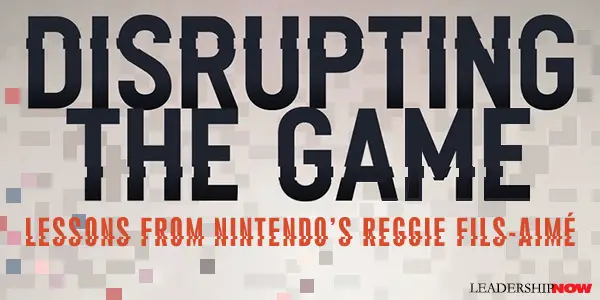Disrupting the Game: Lessons from Nintendo’s Reggie Fils-Amié

GROWING up the son of Haitian immigrants in the Bronx, Reggie Fils-Amié became the president of Nintendo of America through preparation and making the most of every opportunity. Curiosity drove him to new experiences. He writes in Disrupting the Game:
Opportunity came when I saw the potential to achieve in ways that others didn’t immediately see. This led me to often choose untraditional paths that ran counter to expectations.
Disrupting the Game is both a memoir and leadership guide. Placed throughout the journey he shares with us are what he calls “The So What.” These are the lessons gained from those experiences that he hopes will provide actionable advice in our own lives. Below are a several of the over forty lessons presented in the book:
There’s a fine balance between staying true to your belief versus just being stubborn. Do you truly believe in a particular course of action, or is it your ego talking? When you are making a difficult or complex judgment, it’s especially difficult to know your own motivation. Be honest with yourself. Separate your own desire to be right or win an argument from your own core beliefs. Can you honestly say that you believe in your recommendation because it’s the right thing to do—that you’d get behind it even if someone else suggested it?
I learned that opportunity is not simply handed out, like candy at the Bronx bodega. Life is hard and so you must dig deep. Persevere. Demonstrate grit. You take your life experiences and either toughen up or wither away. I got tough. I learned to push for what I wanted. I learned this from my family, and I continue to heed that advice today.
Some organizations assign employees a more experienced individual to be a sounding board and coach. I did this at Nintendo and called these people “mentors.” But this was an improper use of the term. Real mentorship relationships happen over time and naturally—they are not assigned. The relationship is based on a mutual desire for the less experienced employee to do well and grow. Mentors guide and provide perspective; they typically do not tell you what to do. Mentors need not have the same functional background as you, nor must they be in your reporting line. But they should have a strong understanding of your business culture to provide useful perspective.
Enrolling others to support your ideas is a critical skill—one that isn’t taught in business school. No matter your role, you typically are always trying to “sell” a new idea or a new way of approaching a problem. To do this effectively, you need to understand the perspective of others facing the same problem. What do they believe is the best solution? What problems do they see with your proposed plan? How do you marry these two thoughts to get the optimum solution?
Great bosses add value. They build on your ideas. They help you navigate office politics or difficult per relationships. They leverage their own experience to teach you and help you grow. The best bosses are not threatened when their subordinates are actually better than they are; in those situations, a great boss will both learn from you and get out of your way.
Successful innovation is part of an organization’s culture. No matter your role, look for ways to add value to your organization beyond your current responsibilities. Great ideas truly can come from anywhere and from anyone. Encourage this behavior as part of your leadership role.
Whether you are a newly hired university graduate in your first corporate role or a veteran expert hired to shake up an organization, discover and understand the complex web of relationships and activities unique to the situation. Who needs to be your key partner? Where are projects getting stuck? Where are the opportunities for fresh ideas and new approaches? Apply your immediate attention to these areas. Invest time in these relationships and ask open-ended questions. Gather information, then make your plan and begin engaging key constituents.
Recruit advisors who can ask tough questions and push you outside of your comfort zone. Subordinates are often trying to impress you, and it is the rare one who will push back on your ideas. Outside confidants will tell you the way things are, not the way you want them to be. This is a critical perspective. Cultivate advisors—and staff—who are strong-minded and confident enough to challenge your thinking.
Too often, leaders don’t spend time deep in the organization to identify the issues holding people back and to win the hearts of their teams. I believe in “boots on the ground” leadership.
No idea is totally new. Steal and apply. My focus on observing other regions in my company as well as my competitors began during my earliest days at P&G. I would take good ideas, add my own twist or unique element, and apply it to my own business.
Leaders have to develop their self-awareness. As a leader, you’ve achieved success by pushing your ideas and challenging your team to outperform their individual capabilities. The best leaders have the ability to solicit input from others and build on this input. You can’t be so enmeshed in your own ideas that you fail to incorporate the perspective of others.
* * *

Follow us on
Instagram and
Twitter for additional leadership and personal development ideas.
* * *




Posted by Michael McKinney at 08:33 AM
Permalink
| Comments (0)
| This post is about Leaders










